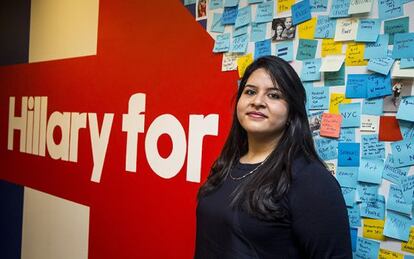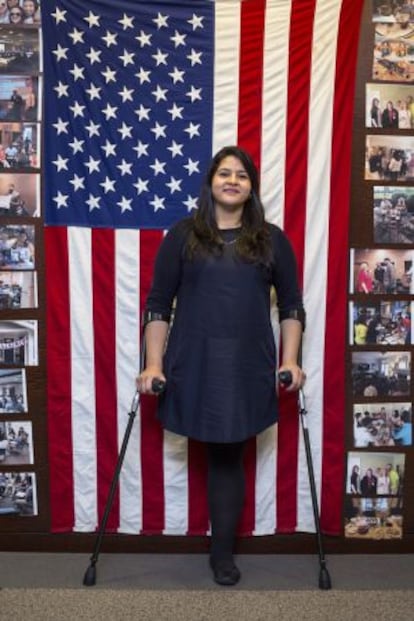The immigrant who’s helping Hillary Clinton mobilize Latino voters
Lorella Praeli was a rights activist before taking on her role for the Democratic candidate


When Lorella Praeli was two years old, in Peru, she was hit by a car. Doctors were forced to amputate her leg. She had trouble getting around, and often fell. Try as she might to get up, she often couldn’t. But her father wouldn’t let anyone help her.
“I would fall down and he would sing to me, ‘When I fall down, I get back up. When I get up, I fall back down. It was a valuable message: ‘You will fall in life. You will have to get up.’ He wanted to make sure that I was able to do it alone, that it was not the end of the world if I fell.”
Clinton needs Latinos if she wants to win the upcoming caucuses and primaries that kick off in February 2016
And so it went. Praeli got up, learned to walk, immigrated to the United States, studied, and became a well-known activist for so-called “dreamers,” undocumented immigrants who, like her, came to this country when they were minors.
Now she is the director of Hillary Clinton’s Latino outreach program. She supervises efforts to mobilize a demographic that was decisive in President Barack Obama’s election in 2008 and in 2012 from the campaign’s Brooklyn headquarters. Clinton needs Latinos if she wants to win the upcoming caucuses and primaries that kick off in February 2016 in order to secure the Democratic Party’s nomination, and then she will need them again to win the presidential election in November 2016.
“Sometimes I have to pinch myself,” the 27-year-old Peruvian native says. “You say to yourself, ‘I was not supposed to be here’.”
Praeli married an American citizen three years ago and became a legal resident, but she is not yet a citizen herself.

Although she is in charge of recruiting Latino voters for the campaign, she has never voted in this country. She hopes to be able to cast her ballot in 2016 after receiving citizenship.
She is working in the engine room of the campaign for a candidate who may become the first female president of the United States, but she still displays an activist spirit.
For her, the world of the undocumented is not an abstract notion. Her father stayed in Peru but her mother, Chela, lives in the United States and is undocumented. Chela is – to use the derogatory term – an “illegal.” It’s a term used by some Republican candidates, such as the business magnate Donald Trump, who is known for his aggressive rhetoric against the undocumented, and Marco Rubio, who, despite being the son of Cuban immigrants, is against plans for the mass-regularization of undocumented individuals in the United States.
There are 55 million residents of Latino descent in the US, which is 17.5 percent of the total population. Around 29 million are eligible to vote in the next presidential election but not all of them will.
In the 2012 presidential election, 23.4 million Latinos had the right to vote but only 12 million cast their ballots. Seventy-one percent of Latinos voted for Obama and 27 percent voted for the Republican candidate Mitt Romney. In order for the Latino vote to be decisive, Clinton has to inspire them to go to the polls.
Clinton’s Formula
And getting them to the polls is Praeli’s job. Her first strategy is to adapt the Clinton platform to Latino interests. For example, Clinton wants to make university education more accessible for applicants with children. Praeli explains that more than 30 percent of Latina women and 18 percent of Latino men in college are parents.
Second, the use of social media is essential. “We are talking to the community in Spanish all the time on Twitter, on Facebook, via text messages...”
The third pillar of her outreach are traditional methods. “Nothing is better than door-to-door.”
And the fourth is Clinton’s personality. “Her first experiences in politics were registering Latino voters in southern Texas,” Praeli says. She has a long-standing relationship with the Latino community, she continues. “In the end, a person wants to know why he should vote for you. Maybe I have two jobs, two or three children, a wife or husband. I’m a student. Our job is to give the voter a reason to stop what they are doing to go vote for her.”
Our job is to give the voter a reason to stop what they are doing to go vote for her”
Clinton gave Praeli the reason to fight for her during a meeting the candidate held with her advisors a few months ago in Washington. “She told us her story, why she does what she does. The subliminal message of all of this is ‘get up and walk.’ It’s a sentence that she herself says: ‘When you fall, you get up’.”
A few days ago, while speaking to El PAÍS in Brooklyn, Praeli finally put the two things together. Clinton’s advice is what her father told her after the accident. Her face lit up.
“It’s incredible, you know? It’s the first time I made the connection. Maybe that sentence means a lot to me because it reminds me of my childhood.”
Translation by Dyane Jean François.
Tu suscripción se está usando en otro dispositivo
¿Quieres añadir otro usuario a tu suscripción?
Si continúas leyendo en este dispositivo, no se podrá leer en el otro.
FlechaTu suscripción se está usando en otro dispositivo y solo puedes acceder a EL PAÍS desde un dispositivo a la vez.
Si quieres compartir tu cuenta, cambia tu suscripción a la modalidad Premium, así podrás añadir otro usuario. Cada uno accederá con su propia cuenta de email, lo que os permitirá personalizar vuestra experiencia en EL PAÍS.
En el caso de no saber quién está usando tu cuenta, te recomendamos cambiar tu contraseña aquí.
Si decides continuar compartiendo tu cuenta, este mensaje se mostrará en tu dispositivo y en el de la otra persona que está usando tu cuenta de forma indefinida, afectando a tu experiencia de lectura. Puedes consultar aquí los términos y condiciones de la suscripción digital.









































